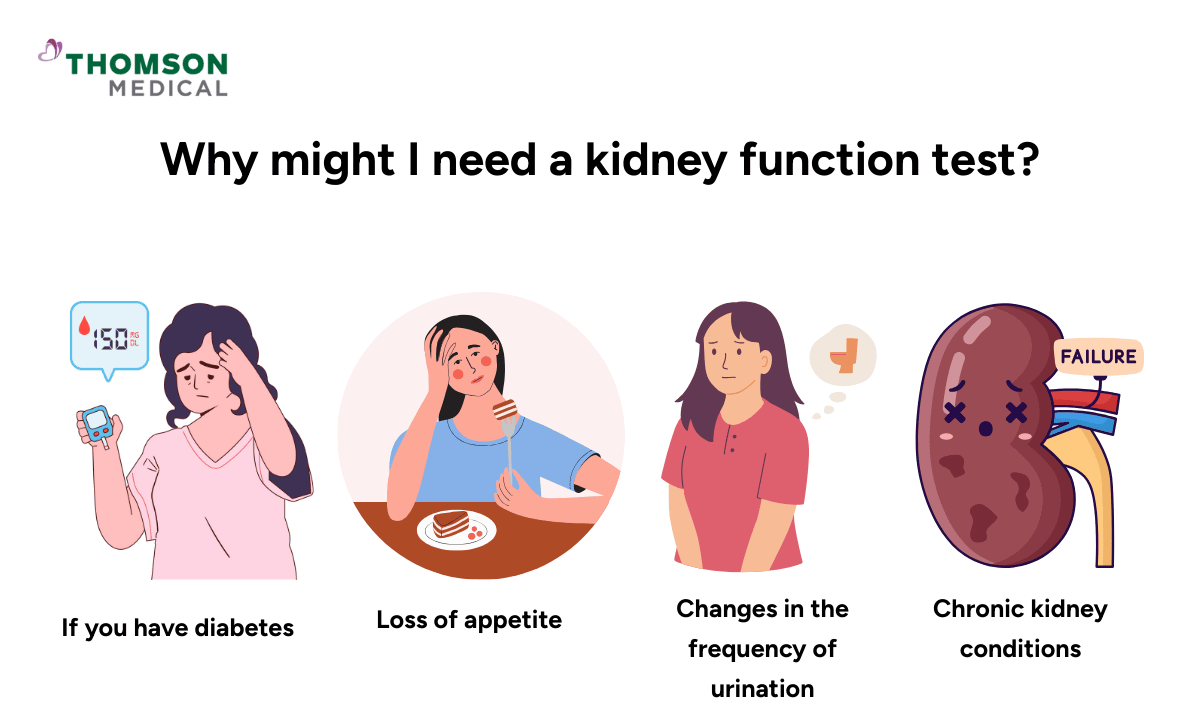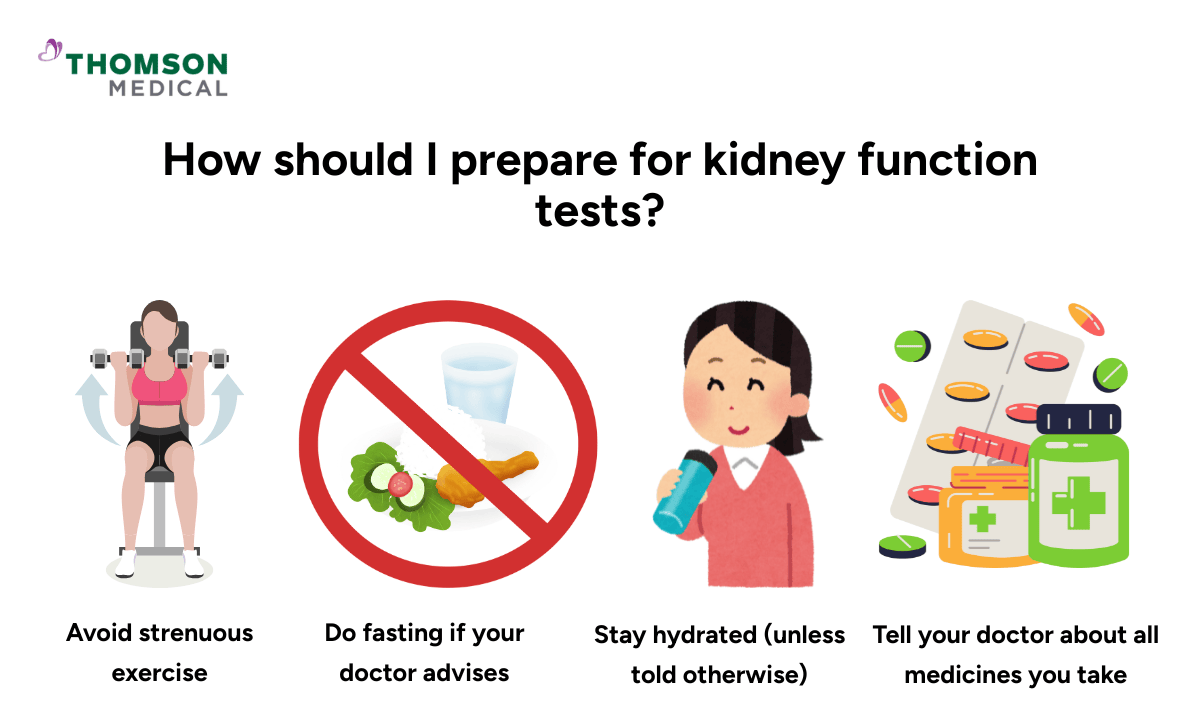What are kidney function tests?
Kidney function tests, also called renal function tests, are simple diagnostic tests that check how well your kidneys are working. These tests help your doctor detect kidney disease, monitor your kidney function, and evaluate your overall kidney health.
Your kidneys play a vital role in keeping you healthy by removing waste, balancing fluids, and managing important minerals (electrolytes) in your body.
When you have kidney function tests, your doctor is looking specifically at how effectively your kidneys are filtering waste from your blood and maintaining the right balance of water, salts, and minerals in your body.
Most tests focus on how well your kidneys’ tiny filters, called glomeruli, are cleaning your blood. When these filters aren’t working properly, waste products build up in your body. Your doctor might order urine or blood tests.
Why might I need a kidney function test?

Your doctor may recommend kidney function tests if you have:
High blood pressure or diabetes
A family history of kidney disease
Chronic kidney conditions that require monitoring
Early detection of kidney problems allows for timely intervention and better management of your health.
Your doctor may also recommend kidney function tests if you experience symptoms such as:
Blood in your pee
Foamy or bubbly urine (a sign of protein in the urine)
Pain or burning when urinating
Frequent urges to urinate, or urinating less than usual
Difficulty starting to urinate
Feeling very tired
Nausea and vomiting
Loss of appetite
Even if your symptoms seem mild, a kidney function test is still recommended, as it can provide important information about your health.
If you notice changes in your urine, pain while urinating, or have concerns about your kidney or urinary health, please consult our specialist. Request an appointment with Thomson Medical today for a kidney function test and receive the care you need.
What are the types of kidney function tests?
There are two main types of kidney function tests your doctor might use to check your kidney health:
Urine tests:
These check how well your kidneys are removing waste and can detect abnormalities like excess protein (proteinuria) or blood in your urine (haematuria).
Blood tests:
These measure how efficiently your kidneys are filtering your blood and can identify signs of kidney dysfunction.
Each type provides different information about your kidney function, and your doctor may recommend one or both depending on your specific situation.
Urine tests to check kidney function
During a kidney urine test, your doctor evaluates your kidney health by checking for protein levels, waste products, and other substances in your urine. Common urine tests include:
Urinalysis:
A general urine test that looks for things like protein, glucose, or blood in your urine, which could indicate kidney or urinary tract infection.
Albumin-to-creatinine ratio (ACR):
Measures small amounts of a protein called albumin in your urine, which can be an early sign of kidney disease.
24-hour urine collection:
This test requires you to collect all your urine over a full day to allow for more detailed analysis of your kidney function.
Red blood cells:
Blood in the urine can mean there is damage in the filtering part of the kidneys.
White blood cells:
These may point to an infection or inflammation in the urinary tract or kidneys.
These tests are simple and non-invasive, and your healthcare provider will explain exactly how to collect your sample.
Blood tests to check kidney function
Kidney blood tests check how well your kidneys are filtering waste from your blood. During these tests, a healthcare professional will take a small blood sample from your arm using a needle. Common kidney blood tests include:
Serum creatinine test:
A serum creatinine blood test measures creatinine, a waste product your kidneys should filter out; higher levels in your blood may indicate your kidneys aren't working well as they should.
Estimated glomerular filtration rate (eGFR):
Calculated from your creatinine level to estimate how efficiently your kidneys are filtering your blood; a eGFR below 60 might suggest kidney disease
Blood urea nitrogen (BUN) test:
Checks the amount of urea nitrogen in your blood, which typically increases when your kidney function is reduced
Electrolyte levels (sodium, potassium, chloride):
These minerals help control muscle movement, nerve signals, hydration, and blood pressure. If their levels are too high or too low, it could mean your kidneys aren’t regulating them properly.
Intact Parathyroid Hormone (iPTH):
This hormone helps control calcium and phosphate levels in the body. Since the kidneys play a role in regulating these minerals, abnormal iPTH levels can signal kidney-related issues, especially in long-term kidney disease.
These blood tests are quick, with results usually available within a few days. While you might feel a brief pinch during the blood draw, the procedure only takes a few minutes.
How should I prepare for kidney function tests?

The preparation for kidney function tests can vary depending on whether you are having a blood test or a urine test.
General preparation tips
Before any kidney function test, remember to:
Inform your doctor about all medications you're taking, including prescription drugs, over-the-counter medicines, vitamins, and supplements.
Avoid strenuous exercise for 24 hours before your test, as vigorous physical activity can temporarily increase creatinine levels.
Follow any specific dietary guidelines from your doctor, such as limiting protein intake before certain tests.
Get a good night's sleep before your test day to help your body function normally.
Bring your health insurance card and identification to your appointment.
Arrive 10 to 15 minutes early to complete any necessary paperwork.
Before a blood test
Blood tests like creatinine, blood urea nitrogen (BUN), and estimated glomerular filtration rate (eGFR) require special preparation.
Follow fasting instructions if given by your healthcare provider. Some tests require 8-12 hours without food, while others don't require fasting. Stay hydrated with water unless specifically instructed to limit fluids. Drink normal amounts of water up until your test.
If you feel anxious about needles, it’s perfectly fine to mention your concerns to your healthcare team. They can offer support and guide you through techniques to help ease any discomfort.
Before a urine test
Urine tests are usually straightforward and don’t require any special preparation. However, it’s recommended to drink a glass of water before your appointment to ensure that you’re able to give a sample when needed.
If you are menstruating on the day of the test, it’s important to let your healthcare provider know in advance, as your period may affect the test results.
What happens during a kidney function test?

Urine test
You’ll need to provide a urine sample using a clean catch method to avoid contamination. You can perform the procedure at your doctor's clinic or at home using the supplies they provide.
Here’s what to do:
Wash your hands with soap and water.
Clean the area where urine comes out using a sterile wipe (your doctor will provide this).
Start urinating into the toilet first.
Pause the stream, then collect urine midstream in the container provided.
Finish urinating in the toilet after filling the container.
Make sure to close the container tightly and follow your doctor's instructions for returning the sample.
Combined testing
In some cases, your doctor might ask you to do a 24-hour urine collection. This procedure means saving all the urine you pass over a full 24 hours. It gives a more complete picture of how well your kidneys are working.
Here’s what to expect:
Your healthcare provider will give you a special container to collect your urine.
On the morning you start the test, do not collect your first urine—just flush it away.
For the rest of the day, collect all urine in the container provided.
The next morning, collect your first urine of the day into the same container.
Once the 24 hours are complete, return the container to your doctor’s office or the lab as instructed.
Blood test
A kidney blood test is a simple procedure done at a clinic or laboratory. Here is what usually happens:
A trained healthcare professional (called a phlebotomist) will gently insert a small needle into a vein in your arm.
They’ll collect a small sample of blood into a test tube.
The sample is then sent to the lab to check for substances such as creatinine and blood urea nitrogen, which help assess how well your kidneys are working.
If you would like more information about kidney function tests, request an appointment with Thomson Medical. Our specialists can help explain this procedure to you in more detail and determine which test best suits your medical condition.
Key components and normal ranges in kidney function tests
Below is a table explaining what your kidney function test results mean:
Test component | Normal range | What it means |
|---|---|---|
Creatinine levels | Men: 0.7 to 1.3 mg/dL Women: 0.6 to 1.1 mg/dL | High creatinine levels suggest the kidneys are not filtering waste effectively. Such levels could be a sign of acute kidney injury or reduced kidney function. |
Blood Urea Nitrogen (BUN) | 7 to 20 mg/dL | Elevated BUN can point to impaired kidney function but may also result from high protein intake or dehydration. Lower levels aren’t usually a concern but may signal liver issues or malnutrition. |
Glomerular filtration rate (GFR) | 90 mL/min/1.73 m² or higher | GFR shows how well the kidneys filter blood. A reading below 60 for 3 months may mean chronic kidney disease, while a reading below 15 may indicate kidney failure. |
Electrolytes (Sodium, Potassium, Chloride) | Sodium: 135 to 145 mmol/L Potassium: 3.5 to 5.0 mmol/L Chloride: 96 to 106 mmol/L | Imbalances can indicate kidney issues. For example, high potassium can be dangerous and suggest poor kidney function. |
Proteinuria and Hematuria | N/A (part of urine analysis) | Proteinuria means excess protein in urine, a possible sign of kidney disease. Haematuria means blood in the urine, which may suggest kidney or urinary tract problems. |
Your doctor will evaluate these results together to get a comprehensive view of your kidney health.
What happens after your test results?
After receiving the results of your kidney function test, your doctor will discuss next steps based on what was found:
If results are normal
If your results fall within normal ranges:
Continue with recommended health screenings and annual check-ups.
Maintain kidney health through a balanced diet, regular exercise, and proper hydration.
Follow up more frequently if you have risk factors like diabetes, high blood pressure, or a family history of kidney disease.
If results are abnormal
If your kidney function test shows abnormal levels:
Your doctor may order additional tests, such as kidney imaging (abdominal ultrasound or CT scan) or more specialised blood work.
Dietary changes might be recommended, such as adjusting protein, salt, or fluid intake.
Medications may be prescribed to treat underlying conditions or protect kidney function.
More frequent monitoring will likely be scheduled to track your kidney health over time.
Your doctor will consider your complete health picture, including your symptoms, medical history, and other test results, before making any diagnosis or recommending treatment options.
FAQ
What is the test for kidney function?
Kidney function is usually checked through a combination of blood and urine tests. The most common tests include serum creatinine, eGFR, BUN, and urine albumin tests to assess kidney health.
What are the symptoms of poor kidney function?
Some symptoms or signs of kidney damage include:
Fatigue
Swelling (edema) in legs, feet, or face
Changes in how often or how much you urinate
Dark, foamy, or bloody urine
High blood pressure
Nausea or loss of appetite
What are the LFT and RFT tests?
LFT (Liver Function Test):
Checks the health and function of your liver.
RFT (Renal Function Test):
Evaluates how well your kidneys are working, including tests like creatinine, BUN, and electrolytes.
How do I check if my kidneys are healthy?
The best way is through regular testing, especially if you're at higher risk. Monitoring for symptoms, keeping your blood pressure and blood sugar in check, and having regular check-ups with your doctor are also important.
How do I clean my kidneys naturally?
While your kidneys clean themselves, you can support their function by:
Drinking plenty of water throughout the day
Eating a balanced diet rich in fruits and vegetables
Cutting back on salt and processed foods
Avoiding heavy use of painkillers and alcohol
Staying physically active and maintaining a healthy weight
How often should I get my kidney function tested?
For most adults with no risk factors and healthy kidneys, testing during routine annual check-ups is sufficient. However, if you have diabetes, high blood pressure, or heart disease, your doctor may recommend more frequent testing. This recommendation also applies if you have a family history of kidney disease or are over 60 years old.
In such cases, testing might be done every 3 to 6 months to closely monitor your kidney health. Regular testing helps detect any changes early. This allows for timely interventions that can protect your kidney function.
The information provided is intended for general guidance only and should not be considered medical advice. For personalised recommendations and tailored advice, please consult a specialist at Thomson Medical. Request an appointment with Thomson Medical today.
For more information, contact us:
Thomson Specialists Paragon (Health Screening)
- Mon - Fri: 8.30am - 5.30pm
- Sat: 8.30am - 12.30pm
Call: 6735 0300
See Health Screening Packages
Notice:
The range of services and tests may vary. Please contact us directly to enquire about the current availability.
Book Health Screening